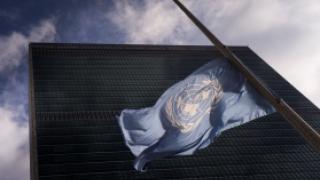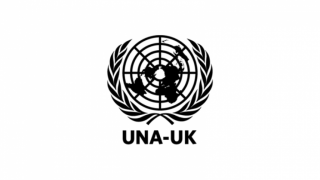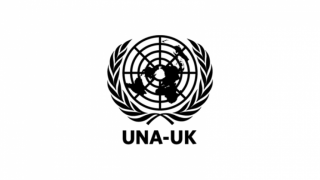
This article will appear in the upcoming Special Issue of New World: The UN at 70. It is published today to mark the signing of the UN Charter on 26 June 1945.
Overstretched and under-funded, the UN is still going strong 70 years after it was founded. It is we, states and citizens, who need to do more.
In 1945, the founding of the UN raised hopes for a new era of peace and prosperity. 70 years on, this prospect looks endangered. A confluence of crises is driving instability across the world. Exacerbated by long-term challenges like climate change, financial debt and inequality, conflicts have erupted and millions have been displaced.
Our interdependence has boosted opportunities for trade and travel as well as our vulnerability to shocks, from bank defaults to disease outbreaks. It has also reduced the ability of our governments to tackle traditionally domestic issues like fiscal balances and job creation. As a result, many of us have narrowed our horizons, becoming more fiercely local, discriminatory and, at the extreme, violent.
The UN is struggling to deal with this grim picture. On the ground, it is working wonders to feed, shelter and protect millions of people. But funding shortfalls have forced it to scale back its efforts in recent months, reducing food aid to Syrian refugees and closing health clinics in Iraq. And political leadership on the hardest issues has been in short supply.
At the policy level, it is working to improve the international community’s ability – and appetite – to tackle these challenges. Preoccupied with problems at home, governments have been reluctant to produce the global solutions needed. Big power relations have soured, compounding this leadership deficit.
Has the UN failed in its quest for progress? Have its efforts over the past seven decades amounted to no more than a sticking plaster on the world’s sores?
Despite the horrific headlines we see every day, the world has become a better place by almost every objective measure (environmental issues are the big exception). The number of inter-state conflicts has steadily declined since 1945. Conflict-related deaths, including from civil wars, have plummeted. In the 2000s, the average annual death toll from warfare was a third of what it was during the Cold War. This decade’s brutal outbursts of violence have not disrupted this downward trend.
Most people today live longer, healthier lives. Globally, life expectancy, education, health, income and living standards have improved by 18 per cent over the past 20 years. The world is also freer. In 1945, almost a third of its people lived in territories that were not self-governing. Since then, over 80 countries have gained independence. The vast majority of states have accepted international human rights laws. Technology has empowered individuals and civil society movements.
The extent to which the UN deserves credit for these developments is debated. Economic growth in China has had a great impact on reducing global poverty. The doctrine of nuclear deterrence has probably helped to prevent big power conflict. But there are areas where the UN’s impact is obvious, from the promotion of dialogue between adversaries, to the eradication of smallpox, and to the system of international agreements that now governs almost every aspect of human endeavour and planetary resource.
On the ground, UN success has depended on clear, achievable mandates. Targeted development campaigns, on maternal and infant health and on school enrolment for instance, have worked. Those seeking broader social transformation, not least on gender equality, have some way to go. Peacekeeping missions have been most effective in smaller countries like Lebanon and Sierra Leone, especially when big powers show sustained interest.
At the highest political levels, the UN has fostered the concept of an "international community", expected to solve problems peacefully, to cooperate on shared challenges and to take action to prevent atrocities. This idea has gained wide acceptance amongst global citizens, who want their governments to abide by shared international standards.
But success depends heavily on states’ willingness to work together. What we are witnessing now is the fading effect of the UN's guiding principles in restraining nationalistic ambitions. The refusal of Putin's Russia to follow UN norms in the Ukraine crisis is more than a straw in the wind. Up to now, Moscow had almost without exception been careful to respect the letter of its international commitments because it believed the UN system constrained the West. The sagas of Kosovo, Iraq, Afghanistan and Libya, and the eastward expansion of NATO, have soured this belief and provoked the Kremlin into a more brutal game of power projection.
The perception that international power structures are frozen in an outdated compromise is also damaging the UN. This perception is not entirely accurate. The five permanent members of the Security Council, for example, still rank in the top six for global firepower and have the same collective share of GDP today as they did in 1945, though the division between them has changed. But to an objective observer it seems justified, particularly in the financial institutions and in the expressions of international behaviour. The New Development Bank set up by the BRICS countries is a non-violent manifestation of this discontent.
Our long period of global peace will not endure unless governments consciously will it to last. The UN has instilled habits between capitals of talking, debating, arguing and resolving that have a very real value. But it has also reinforced the authority of sovereign states within their own territories. And, as always in human affairs, the politics of holding on to power trumps everything else, including the search for collective solutions to global problems as serious as climate change, regional conflict and resource competition.
The stark truth is that international compromises, of the kind that made the establishment of the UN possible in 1945, still appear too costly when measured by the familiar criterion of national interest. In that respect, the patterns of polarised thinking that led to the breakdown of relationships in the decade before the First World War are starting to be recognisable again.
This time the world has institutions, practices and early-warning systems in place to encourage more farsighted policy-making. Political leadership, however, remains trapped in national agendas, or smaller. Unless that changes, unless governments – and the publics to whom they are accountable – embrace the need to use and refresh those institutions, we will have learnt nothing from the previous, and finite, eras of peace.
Natalie Samarasinghe, Executive Director, and Sir Jeremy Greenstock, Chairman of UNA-UK
Photo: UN Photo/Mark Garten






